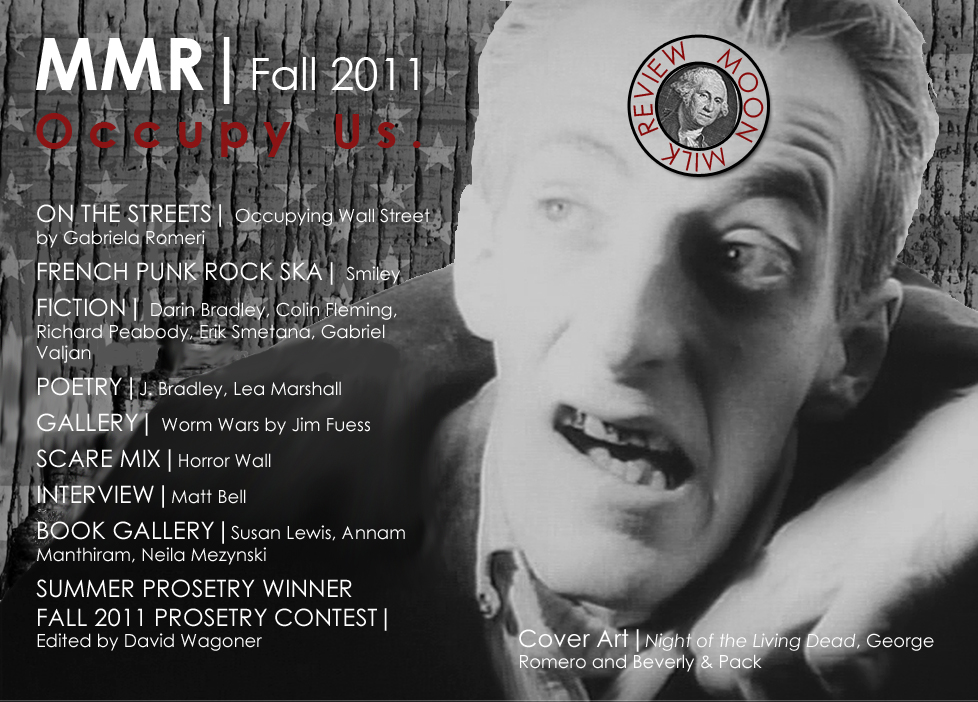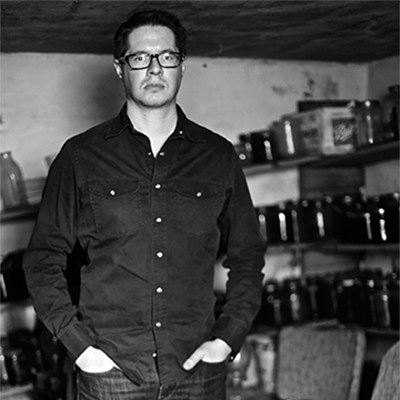
I hadn’t played golf since high school and knew I’d be way out of my league in a threesome with budding law partner Matt and Dr. Dave. They both owned custom-fitted clubs. Still, Night Golf sounded more appealing than my insurance adjustment gig. And it was fun until the zombies came out of the rough.
Matt connected solidly on his backswing with an undead whose rotting head flew back about ten yards. The body tottered then crashed forward, just missing Matt as he bent to pick-up his tee.
“Looks like a clean approach to the green. Nice one,” Dave said. The arc of the Pro V1 was like a red Technicolor tracer into the darkness. I shifted my gaze from the still twitching body, to the neon golf ball kicking down the center of the fairway, back to the zombie head rolling to a stop, an oversized coin, eyes open. Then blink—closed.
The guys holstered their clubs in their bags and climbed into their golf carts.
“C’mon, Preston. We have to go dig you out of the rough. Shake a leg.”
Dozens of shapes loomed along the perimeters of the country club. Holes two to eight were an island to themselves on this side of Bradley Blvd. Residential lights twinkled on the fringes. I shook my head, this couldn’t be happening. Maybe at Congressional but not here at Kenwood.
“You remember when we cut Benson’s English Class and played a round?” Matt said, grinning. He slammed his cart into gear and took off.
Dave blew beer through his nose. “Oh my God, that was the best.”
“That was 12th grade guys,” I said. I’d been at Whitman with them until my alcoholic father forced me to transfer high schools my senior year.
Dave ignored me, jerking the wheel of our cart sharply to the left, so I felt more than saw that we’d collided with another walker. Remnants oozed down the windscreen.
“Everybody else went to Carderock or Widewater, but we’d sneak in here and play 17.”
“Never got to play the last hole. Always had to sneak off or get caught at 18.”
“Preston’s slice is in the woods there,” Matt pointed. Dave stopped the cart and I got out.
“I don’t see anything,” I said. My voice pitched a little high. I needed another beer.
“It’s in there all right,” Matt said. “About ten yards that a way.”
I swatted at some brush, but I didn’t dare focus my eyes on the ground. I constantly scanned the woods for movement. Luckily there was a full moon, so it wasn’t as pitch dark as it might have been. I heard a nauseating crunch and was afraid to turn my head. I could hear the guys laughing. Maybe Dave had taken out another zombie with his Taylor Made driver.
My ball was blinking orange, nestled near a tree trunk. An unplayable lie. I’d have to take a penalty stroke. I bent and reached for the ball. Something swooshed over my head. A growl. Moonlight gleaming off fangs.
I backed up, fast, golf ball in one hand, Bridgestone in the other. Tripped over a branch like some teenager in the movies. Calculated the plausibility of impaling the beast with my 5-iron.
Dave laughed and aimed his Homma gold-plated driver at the snarling shape. With a tiny eruption, the werewolf fell to the ground.
“Let me see that sucker,” Matt said, and Dave handed over the driver. “Damn, you gotta see this Preston. Does the PGA know about this?”
“Silver bullets,” Dave said.
Matt handed me the shiny driver. I flashed on Steed and The Avengers. The handle folded down. Push button trigger. The damn thing was ingenious.
By now the werewolf had reverted to human form. Coach Swanson. High school golf coach who’d made my life a living hell. Kicked me off the team for skipping our match against Gonzaga. I was too busy sharing afternoon delights with Dave’s old girlfriend, Laurie. Which reminded me why I was out here on this cursed golf course. Alexis. Dave’s new girlfriend. I planned to tell him. Confess everything.
“Didn’t you shag his daughter one summer, Preston?” Matt asked, taking practice putts while I held the flagstick away from the cup, glued to the spot. “Ahem,” Matt said, and waved me over to the left.
I obliged. Though I could hear constant shuffling. That drunken stumbling zombie walk.
“Never did get along with him,” I said.
Matt made the two-putt. “That puts me up one. Let’s see now. Dave’s still at par—“
“Bloody hell,” Dave said.
“And that puts Preston down four shots.”
We climbed into the carts and sped off on the blacktop trail to the par 3 third hole.
By the par 3 sixth hole I was two shots down at 20, which was unbelievable since I was playing solely on memory. And even knowing the course layout in my sleep, and able to anticipate the greens, I didn’t know where the pins were placed and my buddies did. Scrambling at a supreme disadvantage and leading.
“Beginner’s luck,” Matt said, clearly miffed. His weekend stubble and Red Sox nation cap made his face nearly invisible.
“Let’s make it more interesting,” Dave said. “Bet the match?”
“No way,” Matt said, “Bet on every hole.”
“Even better.”
“Let’s start at $20 a ball,” Matt said. “You’re good for that, right Preston?”
The undead continued to hound us. It was becoming routine to dismember them with a wedge or a driver. Lob body parts into the night with a well-placed bunker shot. I was beginning to have fun again despite my unwieldy rental clubs.
“So you said you wanted to tell me something, Preston. What’s up?” Dave said, popping another brewski. I’d stopped at Talbert’s earlier and provided the beer.
“Yeah,” I said, stalling. If I told him now they might just leave me on the course to fend for myself. Semi-lapsed Catholic that I am, I reached into my shirt and felt for the crucifix on the chain around my neck.
“Well, what?” Dave said.
“It can wait,” I said, “until the 19th hole.”
“You know what I was wondering?” Matt said.
“What?” Dave said.
“Where that new gal of yours is from.”
“One of the ex-Soviet Bloc countries. I can never remember which,” he said.
Alexis was from Latvia, a tall leggy blonde, and just about everything my hard little heart ever wanted. She was bratty, cruel, and oh so delicious. She read me the riot act when I bungled a pass — I couldn’t resist her — and when I stopped, dumbstruck, wondering what could have possibly possessed me — an easy six feet in heels — she asked if I understood in that accented broken English of hers. I said yes. Good, she said, and pushed me against the wall and stuck her tongue down my throat. I’ve never met a woman who was hungrier for sex. We’d been meeting for a month solid every Wednesday when Dave had his usual tee time. She complained that he couldn’t keep up with her. Me either, I’d quickly become an addicted, exhausted, guilty ruin who dreamed about her every night.
At the eighth hole Dave was trying to juggle a glowing green golf ball on his club a la Tiger Woods before turning and jamming the handle of the Callaway through the belly of a zombie in a gas station uniform. He put a foot on the sunken chest to extract it and then smashed the head to pulp, while Matt shanked a tee shot into the trees.
“Aggh,” Matt shouted and tossed his club off the fairway where it connected with something solid that crashed to the ground. “I always hated that f-ing club.”
“Come by the Pro shop,” Dave said, “I’ll hook you up with Potts. He can get you a good price on a Ping or S-Yard set.”
The trip back across Bradley Blvd was uneventful. I hoped everything that had happened so far was restricted to that isolated portion of the course. Perhaps the members had built on an unmarked graveyard or something? My mind desperately trying to find logical explanations for what was happening, though by now I thought nothing of swinging a club around like a ninja and littering the elite golf course with mounds of decaying flesh.
The ninth hole is a 517-yard par 5. It’s the longest on the course and the one that had often sunk my game in the past. There was a glow in the distance which, as we raced the carts closer, turned out to be the dying embers of a pair of golf carts.
“Looks like the previous foursome won’t mind if we play through,” Dave said. “Bummer. They tried to squeeze in one round too many before dark,” Matt said. “You have got to be ready for any eventuality.”
The carnage was too graphic. Viscera and blood trails. I whiffed my tee shot and then sliced into the woods 200 yards away.
“Uh oh,” Matt said, pointing back toward the clubhouse, “this looks bad.”
A golf cart approaching, but not on the blacktop track. What the? They were bouncing around on the green and heading vaguely toward where we stood.
“Can zombies drive?” I asked.
Dave had already turned his cart around, charging the lights like a knight on a four-wheeler, the moon shining off his head, his titanium golf club lance raised to the heavens.
“C’mon Preston, climb in,” Matt said. We gave some war whoops and were off in tepid pursuit — Matt more than willing to let Dave have at it with the motorized zombies. And have at it, Dave did. He drove circles around the undead and with a few well-placed whips of his club, beheaded the driver. It was impossible to count how many zombies were stuffed into the compartment, but they were powerless to do anything save groan as their driverless cart zoomed down a steep hill and slammed into a strand of ghostly trees.
The zombies thinned out considerably by the time we reached the 18th green just as the game was getting interesting. Dave was one under par, I’d overcome the shakes, some double and triple bogeys, and was one over with Matt two over. I owed Dave close to $80. He’d been winning consecutive holes on the back nine. I began to wonder if he wasn’t sandbagging me.
Matt muffed his putt and shot a bogey. I made par. It was all up to Dave now. Matt held the flagstick, while Dave took a few practice putts with his Heavy Putter. He was Mr. Intensity. He liked winning.
Dave made a slick tap and his glowing green ball zipped for the hole. My eyes locked on the rolling golf ball, though my mind scrambled with what I’d tell him after the match.
As the ball reached the lip of the cup, Matt swept skyward. I heard wings. It looked for a second like a white sheet had swallowed him. All went silent save for the hollow echo of Dave’s ball circling the cup rim and then Matt crashed to earth with a sickening crunch. Dave didn’t blink, concentrating only on the green rotations his ball was making. He raised his putter skyward as the ball fell. At least I think it did. I couldn’t see as a white shape collided with me and lights out.
In my dream I told Dave about Alexis. I even fessed up to the high school tryst with Laurie. Dave smiled and forgave me. He handed me a big red balloon. I was bouncing it casually in my hand when I came to on a plush chaise in the bowling alley. My head felt caved in.
“How are you feeling?”
I turned and there was Alexis in a floor-length white nightgown. I rubbed my eyes. Rubbed my head. She appeared to be floating.
“A nasty blow to the head,” she said, settling beside me on the crimson chaise. She smoothed my forehead with her ivory fingers, her eyes glowing.
“Oh Alexis,” I whispered.
“Hmm,” she said, pressing her lips against my neck.
“What about the others?”
“Others?” she whispered, maneuvering so that with the light, her body was visible beneath the sheer fabric.
“Dave and—“
“No talk,” she said, breathless and pouty. She pushed me back onto the chaise. I yanked the crucifix out of my shirt.
Alexis reared back and slapped my hand laughing, shaking her head. She was gorgeous.
“Un un un.” She shook her head smiling. “I was going to snack but now I think a meal perhaps?”
“Alexis,” I said.
She hefted me in her arms like I was a stuffed animal she’d won at the fair. And then something wooshed past me and Alexis let out a scream dropping me, before crashing across the eight Duckpin lanes a sizzle of smoke. My pants were wet.
And there were Matt and Dave in the shadows looking beat-up like extras from a Tarantino flick but still alive and laughing.
“You were right Matt,” Dave said handing him a wad of bills. “I was way too into her to notice that she was a fucking vampire.” Then he focused on me. “I was going to feed you to her you slimy asshole.”
“I was going to tell you tonight.” The sky was beginning to show traces of light and pink clouds. Had we really been at Kenwood all night?
“What’s wrong Preston? You can’t get it up unless I’ve been there first?”
“C’mon guys, let’s not kick a dead vampire around,” Matt said, he put one arm around Dave’s shoulders. “Hey, wanna raid the clubhouse? There must be some prime scotch stashed there ehh?”
What was wrong with me? I shook my head promising never to make a pass at one of Dave’s girlfriends ever again.
Matt was smiling, bouncing a red balloon up and down in one hand while Dave swiftly moved to clear away the chairs barricading the bowling alley.
“You knew she was a vampire?” I asked, making my way to a kneeling position.
“Holy water balloons,” he said nodding. “You just never know about Night Golf.”



